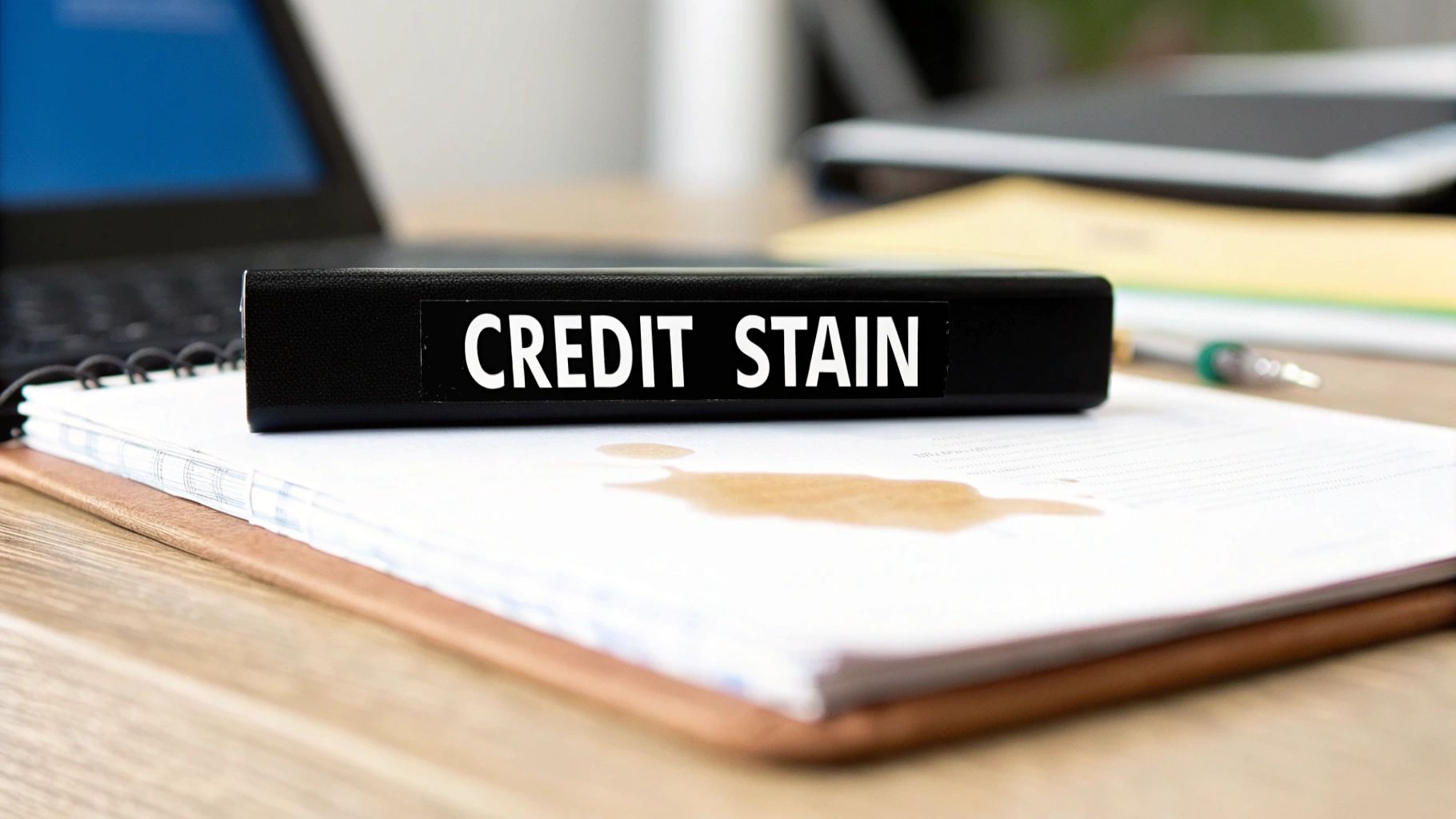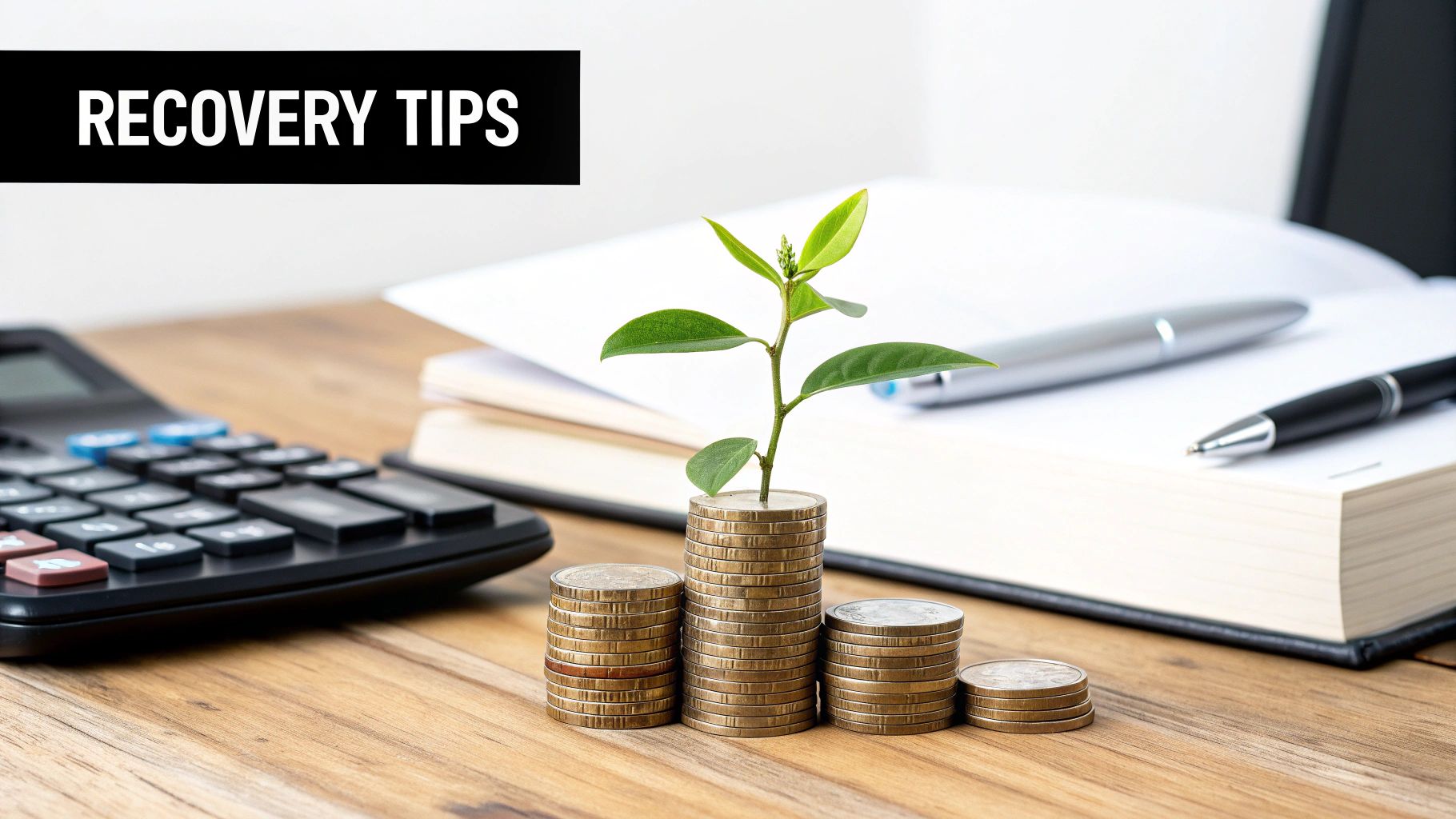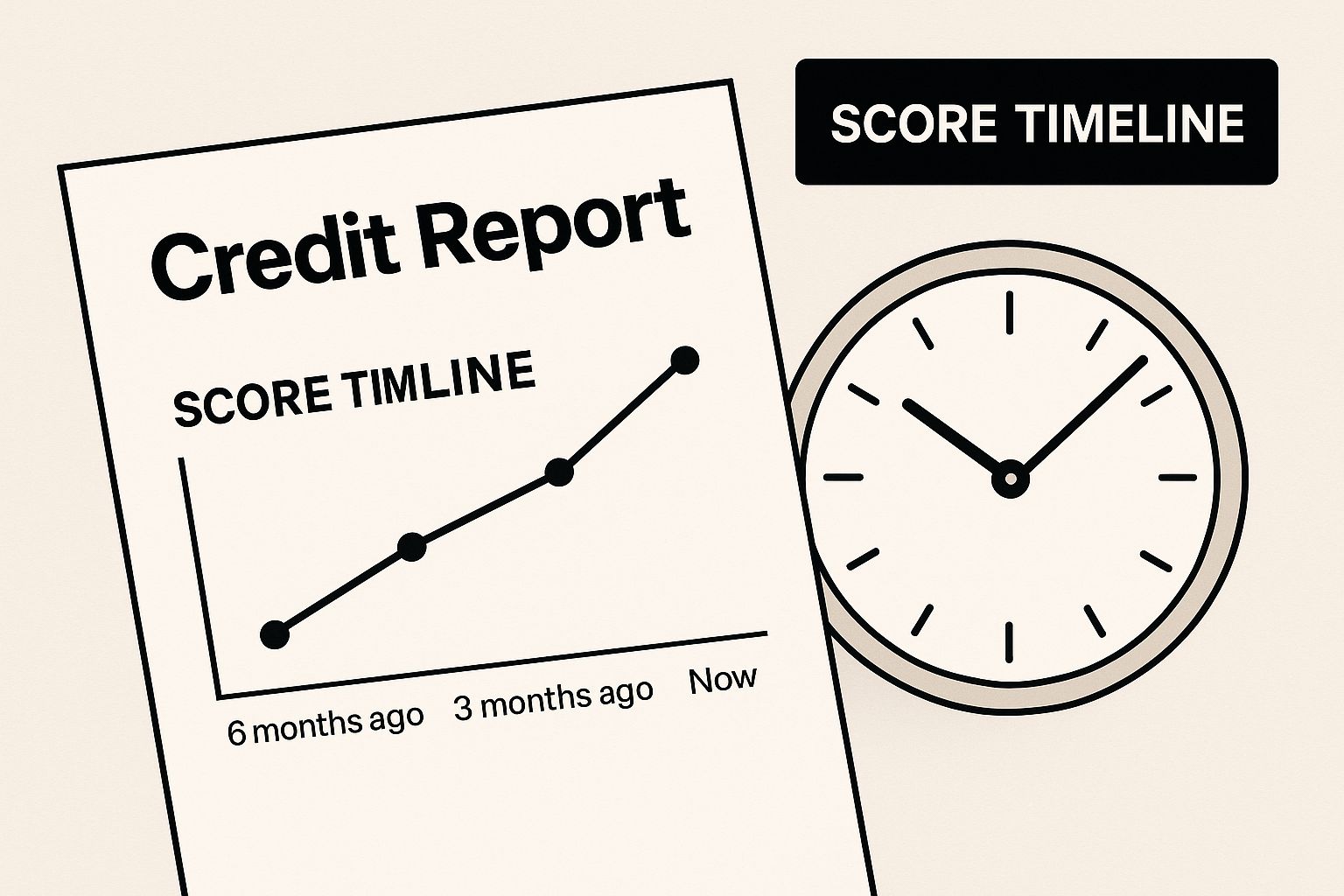How Long Do Late Payments Affect Your Credit Score?

When you miss a payment, it can hang around on your credit report for what feels like forever—specifically, for up to seven years from the date you first missed it. That number sounds scary, but the good news is that its power to hurt your credit score fades over time, especially if you get back on track with on-time payments.
The Seven-Year Mark on Your Credit Report

Think of a late payment like a deep scratch on a new car. At first, it's all you can see. It’s fresh, noticeable, and significantly detracts from the car's appearance. For lenders, a recent late payment is just like that—a major red flag that immediately makes them question your reliability.
But as time goes on, that scratch starts to weather. New memories and experiences—or in this case, a consistent history of on-time payments—begin to overshadow that one old blemish. Lenders start paying more attention to your recent, positive financial habits rather than a single slip-up from years ago.
When Does a Late Payment Actually Get Reported?
One common misconception is that a payment is reported as late the very next day. Thankfully, that's not the case. Most creditors won't report a late payment to the credit bureaus until it’s at least 30 days past the due date. This gives you a bit of a buffer to fix a simple mistake before it shows up on your credit history.
Once that 30-day mark is crossed, however, the damage is officially done. A single 30-day late payment can knock a whopping 110 points off a high FICO score. And it only gets worse from there. A payment that becomes 60 or 90 days late will do even more damage because it signals a more serious financial problem.
To get a better handle on how this reporting works, resources from experts like Rocket Money can offer deeper insights into the process.
Let's break down the timeline of how a late payment progresses and when it finally disappears.
Late Payment Reporting Timeline
This table shows how a late payment is reported over time and when it will eventually be removed from your credit history.
The key takeaway is that the negative impact is front-loaded. A late payment does the most harm in its first couple of years.
Why Your Payment History Is Your Financial Report Card

To really get a handle on how late payments impact your credit, it helps to think of your credit report as your financial report card. It covers a few different "subjects," but one of them—your payment history—carries more weight than all the others.
Every time you pay a bill on time, it's like getting an 'A' in that class. It demonstrates consistency and tells lenders you’re someone they can count on. Rack up enough of those 'A's, and you build a strong financial transcript that proves you know how to manage your obligations.
On the flip side, a single late payment is like getting a surprise 'F' that ruins a perfect streak. It doesn’t just drag down your average; it's a red flag for anyone reviewing your file, from mortgage officers to credit card companies.
The Most Important Grade You Can Earn
So, why all the fuss over this one factor? It's simple: your past actions are the best indicator of your future behavior. Lenders just want to know if you're likely to pay back what you borrow. Your track record of payments is the clearest, most direct evidence they have.
This is exactly why credit scoring models lean on it so heavily. The FICO® Score, for example, bases a whopping 35% of your total score on payment history alone. It's the single biggest piece of the pie.
Understanding this is key to building good credit. You can dive deeper into this foundational element in our guide on what a payment history is. Just remember, when you pay on time, you're doing more than just avoiding a late fee—you're actively building an asset that opens doors to better rates and bigger opportunities down the road.
How Different Types of Late Payments Impact Your Score
It’s a common misconception that all late payments are created equal. They’re not. Think of it like this: a payment that’s 30 days late is a small crack in your financial foundation, but a 90-day late payment is a full-blown earthquake. The damage gets exponentially worse the longer the bill goes unpaid.
A single payment reported as 30 days late can knock a good credit score down, sometimes significantly. But when that same account hits the 60-day and then 90-day mark, the damage multiplies. Each of those milestones gets reported to the credit bureaus as a separate, more severe event, signaling to lenders that you're not just forgetful but potentially in serious financial trouble.
This is how those negative marks can stack up over time on your credit report.

As you can see, both the severity and the timing of a late payment are huge factors in how much it will hurt your score and for how long.
To get a clearer sense of the potential damage, it helps to see how these delinquency levels stack up against each other.
Severity of Late Payments on Your Credit Score
Keep in mind these are just estimates—the exact drop depends on your starting credit score and overall credit profile. A higher score often sees a bigger drop from a single negative mark.
The Type of Account Matters, Too
Beyond how late the payment is, what you paid late also makes a huge difference. Lenders don't view a missed payment on a store credit card the same way they view a missed mortgage payment.
Here’s a quick breakdown of how different accounts are often perceived:
At the end of the day, a 90-day late mortgage payment is going to leave a deeper, more lasting scar on your credit history than a 30-day late payment on a retail card. Understanding these nuances is key to protecting your score.
Your Timeline for Credit Score Recovery
The good news? Your credit score can absolutely recover from a late payment. I like to think of it like a cut healing—it hurts a lot at first, but over time, it fades into a scar as new, healthy skin grows. In the same way, your credit score starts to mend as you add new, positive payment history on top of that old mistake.
While the negative mark technically stays on your report for seven years, its power to hurt your score shrinks with each passing year. The first two years are really when it does the most damage. After that, its influence starts to fade as lenders begin to care more about your recent, responsible financial habits.
Tracking the Fading Impact
A single late payment can knock your score down fast, sometimes by as much as 60 to 110 points, especially if you had a high score to begin with. But as long as you keep all your other payments on time, that damage isn't forever.
Most people see their scores start to look much healthier around the five-year mark. By year seven, poof—the late payment is automatically gone for good. If you want to dive deeper into how that initial score drop is calculated, you can check out these insights from Experian on credit scores.
The best thing you can do is focus on what you can control right now. Making every single payment on time is the single most powerful way to rebuild your credit. It definitely takes patience, and our article on how long it takes to build credit lays out a great roadmap for that journey.
As you work on your credit recovery, learning how to get a lower interest rate on future loans will become a huge financial win. A stronger credit history, built on a foundation of on-time payments, eventually opens the door to better rates, saving you a lot of money down the road.
What to Do After a Late Payment
That sinking feeling when you realize you've missed a payment is all too common. But what you do in the moments and days that follow can make a huge difference. The goal is to be quick and smart to keep the damage to your credit score at a minimum.
Your first move? Pay the overdue bill right away. If you're less than 30 days late, you might be in the clear. Creditors typically don't report late payments until they hit that 30-day mark, so acting fast can prevent it from ever showing up on your report.
Have a Conversation With Your Creditor
Once you've paid up, it's time to pick up the phone and call your creditor. This is especially important if you have a good track record with them. You're going to ask for a "goodwill adjustment."
Calmly explain that your late payment was a one-time mistake and ask if they would be willing to remove the negative mark (or not report it in the first place). There's no guarantee they'll say yes, but many companies are willing to extend some grace to a customer who usually pays on time. It's a simple call that could completely erase the mistake.
Make Sure It Never Happens Again
With the immediate fire put out, your next job is to build a system that prevents future slip-ups. You want to make missing a payment almost impossible.
For extra support, you might also look into finding a financial accountability partner to help you stay motivated and on track with your goals.
Check for Errors and Dispute Them
Finally, always double-check your credit report to make sure the late payment was reported correctly—or if it was even your fault. Errors are more common than you'd think, and you shouldn't have to pay for someone else's mistake.
If you find something that looks wrong, you have the right to dispute it. We walk you through exactly how to do that in our guide on how to dispute your credit report. Taking these steps puts you back in the driver's seat and starts you on the path to rebuilding your credit.
Got More Questions? Let's Clear Things Up
Even when you know the rules, real-world credit situations can feel messy. You're not alone if you still have a few lingering questions about late payments and what to do next. Let's tackle some of the most common ones.
Will One Late Payment Tank My Credit Score for Good?
It can certainly feel that way. A single late payment can cause a surprisingly sharp, immediate drop in your score, especially if you’ve worked hard to build an excellent credit history. The higher your score is, the more a single mistake can hurt.
But here's the good news: it's not permanent. Think of it as a deep scratch, not a broken engine. The negative mark will fade over time, and your score can start bouncing back much faster if you get right back to making every single payment on time from that point forward.
I Paid Off a Collection Account. Does That Erase the Late Payment?
Paying off a collection is absolutely the right move. It shows lenders you take your obligations seriously and it's a huge step for your own financial well-being. But it doesn't quite rewrite history.
The original late payment history that led to the collection will stay on your report, as will the collection account itself.
That "paid" status tells future lenders you made things right, which is a far better story than an unpaid debt.
What's a Goodwill Letter? Is It a Real Thing?
It is! A goodwill letter is exactly what it sounds like: a polite, professional letter you send to a creditor asking them to remove a late payment from your credit report as a gesture of goodwill.
This approach has the best chance of success when the late payment was a one-off mistake and you otherwise have a long, stellar history with that lender. You simply explain what happened (an unexpected emergency, a technical glitch, etc.) and ask for a break. There’s no guarantee they’ll say yes, but for a loyal customer, it’s often worth a shot.
How Quickly Can I Expect My Score to Rebound After a Late Payment?
Your score starts its comeback tour the moment you catch up on that payment and resume your on-time streak. While the late payment notation will stick around for seven years, its power to drag down your score diminishes significantly with each passing month.
New, positive information—like consistent on-time payments—starts to bury that old mistake. If you stay disciplined, you could see a real, noticeable improvement in just a year or two as you prove the slip-up was the exception, not the rule.
Ready to take control of your financial future? itin score is the first credit-building platform designed for ITIN holders. Get free credit monitoring and personalized advice to build the credit history you deserve. Learn more at https://www.itinscore.com.